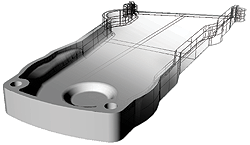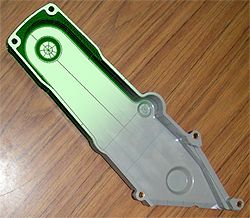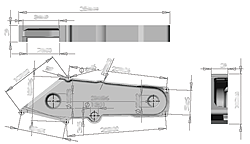SITUATION

CAD-to-Wireframe (Motorcycle Cover A)
Engineers often need to design parts that fit inside objects that lack CAD data. The measurements of these legacy parts are typically obtained via calipers or a Coordinate Measuring Machine (CMM). However, these methods often suffer from human error or cannot sufficiently measure the complex surfaces. This client needed accurate models of a pair of OEM motorcycle chain covers to design new pieces to fit within the physical part. For the client to ensure that the newly designed parts would fit once manufactured, they would need CAD models that match the ideal as-designed shape of the covers.
SOLUTION

Parametric CAD Data (Cover B)
Our team was commissioned to scan and reverse engineer parametric CAD models of the motorcycle chain covers. Our engineers used the turntable feature of the Konica Minolta VIVID 9i to accurately scan each cover. The scan data, accurate to within 0.002 inches, captured the complex shape, curves, and features of the chain covers that would have been difficult to measure manually with calipers or a CMM.
Our team used Rapidform XOR’s powerful reverse engineering tools to model the entire part parametrically. Using Rapidform enabled our company to retain all modeling history for the parametric model. Furthermore, the CAD data generated by our team was suitable for generating 2D drawings for documentation purposes.
RESULTS

Motorcycle Cover 2D Drawing
Our team’s efficient and fluid workflow in their scanning and reverse engineering techniques resulted in the client saving a substantial amount of time and money in their design process. Creating accurate parametric CAD models of the chain covers would have been difficult, expensive, and taken significantly longer to model without the use of 3D scanning due to the complex, freeform surfaces. 3D scanning provided the client with superior quality data and accurate 2D drawings that enabled them to confidently design new parts to fit inside.
